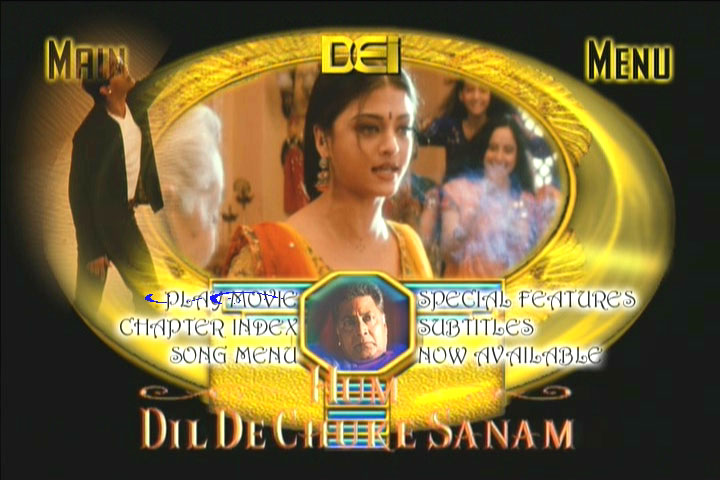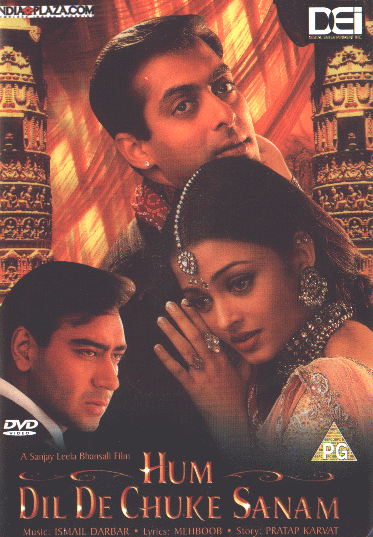 |
HUM DIL DE CHUKE SANAM ("Straight From The Heart") (1999)
Produced, Written and Directed By Sanjay Leela Bhansali
Starring: Salman Khan, Ajay Devgan, Aishwarya Rai, Zohra Sehgal, Vikram Gokhale, Smita Jaykar, Rekha Rao, Rajeeve Verma, Kenneth Desai, Ghanshyam Naik, Helen
Music: Ismail Dabar Running Time: 187 Minutes
CineRating: 6 out of 10
|

While most fans of Bollywood cinema will tell you that it's the exotic visuals, extravagant song-and-dance numbers, or emotionally stirring storylines that keep them coming back for more, there's certainly an added ingredient that continues to ensnare male moviegoers outside of India to these sometimes ridiculously fluffy three-hour musicals. To put it in two words: Aishwarya Rai. Or how about: Rani Mukherjee. Or in one word...Tabu. All three are part of Bollywood's seemingly endless supply of beautiful actresses -- the type who can take an ill-conceived project and suddenly turn it into something emminently watchable.
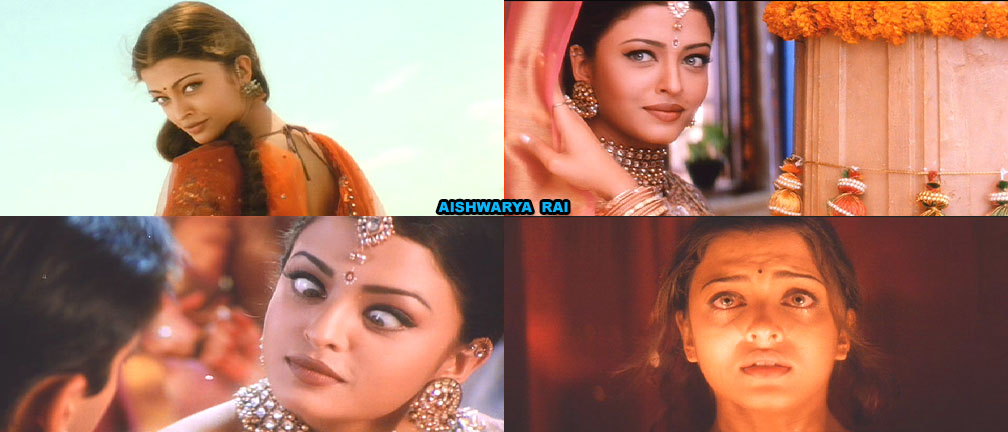
With eyes that seem to take up more than half her face, Aishwarya Rai (commonly referred to as "Ash") is a former Miss World (1994), one of India's highest paid actresses, and a superb dancer whose penchant for swaying her head from side to side makes her appear at times like a bobble-head doll come to life. In short, she's a knockout, and a pretty decent actress too. It's hard to imagine a dim-witted feature like Jeans being bearable without Rai's dancing in front of the Seven Wonders of the World or the delicate unease she conveys at having to masquerade as a pair of twin sisters. Sandwiched between two miscast male leads in Subhash Ghai's Taal, Rai elevates the film from being little more than a corny love triangle into something that almost invites the word "classy." It's of little surprise then that she fits right in with the sumptious decor of Hum Dil De Chuke Sanam, one of the most visually intoxicating movies of the past decade. Director Sanjay Leela Bhansali (Devdas [2002]) exploits Rai's beauty as well as the strikingly colorful settings and costumes to their full effect, but fumbles the narrative ball once too often, allowing even Rai's considerable charms to get lost amid the film's inconsistent tone and lackluster pacing.

Intended as an epic meditation on the meaning of love, Bhansali's film starts off by introducing the ravishing Nandini (Rai), the daughter of a famous classical singer (Vikram Gokhale) who is about to receive a new student from Italy. The pupil, an Indian named Sameer (Salman Khan), arrives at the singer's staggeringly majestic palace and becomes the target of Nandini's wrath due to the fact that she was forced to give up her room to him. With his unorthodox behavior, the playfully romantic Sameer quickly wins over Nandini's heart, but another man, the quiet and kind Vanraj (Ajay Devgan), also falls under her spell, and soon Nandini's father is arranging a marriage between the two. When he discovers that Nandini and Sameer have been carrying on an affair under his nose, the outraged father retires from singing and makes Sameer promise never to see his daughter again. Sameer dutifully abides by the father's request and returns to Italy, not knowing that Nandini has been pushed into marriage with Vanraj, who is puzzled by his new bride's refusal to show him any intimacy. Vanraj begs Nandini to give him a reason for her coldness, but is finally left to discover the answer for himself when he comes across one of Sameer's letters. Realizing that she can never be happy with him, Vanraj risks his family's reputation by taking Nandini to Italy and reuniting her with her lost love. As the search for Sameer reaches one dead-end after another, Nandini takes out her frustration on Vanraj -- whose selfless devotion to her finally makes her realize just how much he truly loves her.

A tremendous boxoffice smash upon its release in 1999, Hum Dil De Chuke Sanam boasts a pair of thematically divergent halves -- pandering to the young at heart in its first ninety minutes as it revels in the rebellious behavior of its youthful lovers, and then transforming in its second half into an ode to traditional values. Both halves feature their share of dazzling song-and-dance numbers, but the story's content fails to live up to the movie's spectacular visual artistry, with the chief flaw being Salman Khan's glaringly inadequate performance. Though he attacks his role with exuberance, Khan's lightweight presence is far more suited to dopey comedy than soaring melodrama. With his bulging eyes, preppy haircut, and rather high-pitched voice, he seems completely out of place amidst the visual grandeur, and his hapless attempts at serious emoting are among the most excruciating experiences that Hindi cinema has to offer. Regrettably, Bhansali allows the film to sink to Khan's level, indulging in some tiresome lowbrow humor that includes flatulence jokes which all but destroy the film's near-magical tone. It's too bad Bhansali didn't get one of the other Khans (namely Aamir or Shahrukh) to play the lovestruck Sameer, as either actor would've brought far more gravity to the role (and it's doubtful that Aamir would've tolerated Bhansali's obvious lapses in judgment).
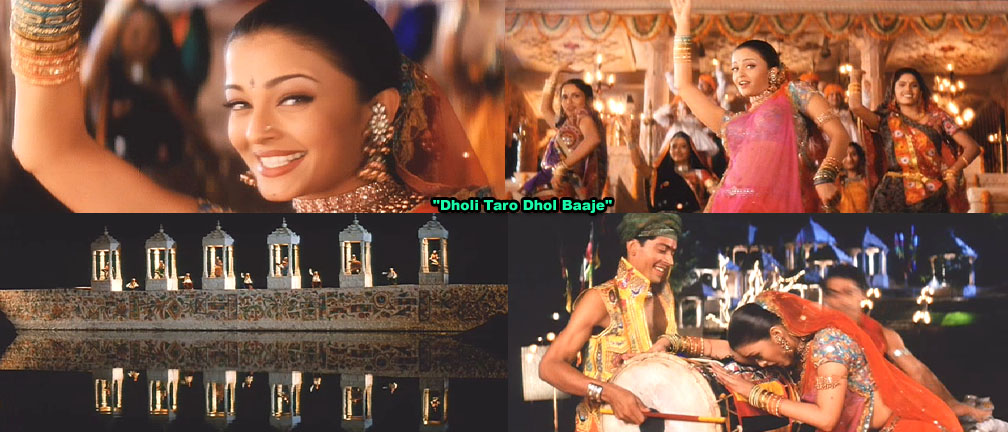
That Sameer takes himself out of Nandini's life in an all too-willing manner, and that Ajay Devgan's performance completely outclasses Salman Khan's manages to throw the film's crucial love triangle totally out of balance and casts an unfavorable light upon Rai's character, whose obsession with Sameer seems less like a symbol of undying love and more like a sign of mental illness. (According to gossip magazines, Rai and Khan went on to share a rather stormy and controversial relationship off-camera.) And although the film's second half loses its gorgeous palatial setting in favor of much more mundane scenery, the positive trade-off is that Khan's screentime decreases and Ajay Devgan's expands. Still, Vanraj is so clearly superior to Sameer in every way that one can't help but wish that Devgan's eternally patient husband would break down and start slapping some much-needed sense into his woefully misguided wife.

If Bhansali botches the movie's tone and logic in key scenes (including Nandini and Vanraj's ridiculous encounter with a pair of joyriding loonies in Italy -- which, due to the film's budgetary constraints, is actually Hungary), allows Aishwarya Rai to over-emote, and methodically stretches out the utterly predictable plot to its three-hours-plus breaking point, he also manages to score a sixer with his scintillating presentation of the film's grandly scored song-and-dance numbers -- in particular the uptempo "Nimbooda," in which Rai brings down the house as she prances around the ballroom like a cat on a hot tin roof. Bhansali also comes up with some inspired visual flourishes, including a memorable scene in which Nandini's flowing "pallu" catches fire as she races past a candle light in order to grab a final glimpse of her departing Sameer (reportedly Rai almost caught fire herself doing the dangerous stunt). And if Bhansali's judgement seems questionable throughout Hum Dil's narrative, he does come up with a perfectly acceptable conclusion that finally does justice to Ajay Devgan's effectively understated portrayal.
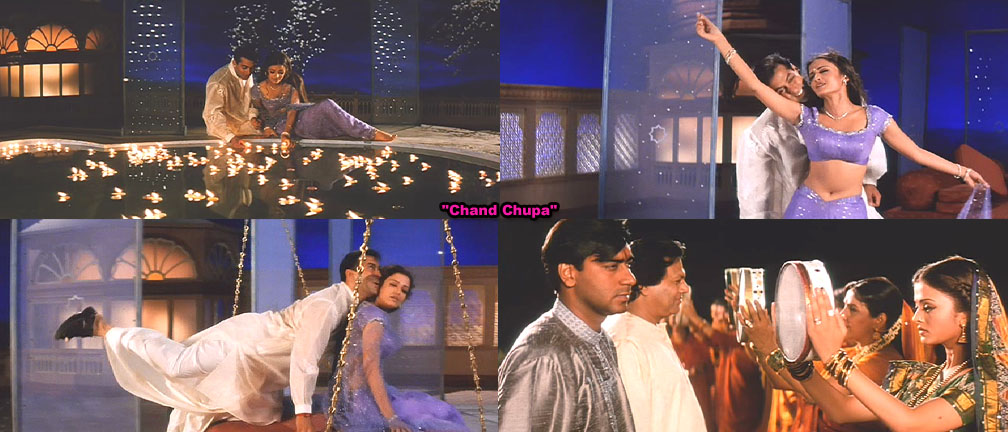
The DEI DVD presents the film in its original 2.66:1 aspect ratio, unlike the one-disc Video Sound release which features a cropped picture that compromises many of the film's beautifully composed widescreen images.
The Bollywood Award show highlights included on the second disc present some rather crudely edited together clips of Hum Dil De Chuke Sanam's various honors, including one to an absent Aishwarya Rai which is co-presented by Shahrukh Khan and Angelina Jolie.
|
|
|
DVD Specs:
DEI 2-DVD SET
All Regions
Removable English, French, Japanese, Spanish, Arabic Subs (songs included)
Making of Hum Dil De Chuke Sanam
Bollywood Awards UK IFFA Awards
Bollywood Awards US Zee Gold Awards
Theatrical Trailer
13 Song Promos
* Hum Dil De Chuke Sanam Releasing in Japan - Planet Bollywood
|
|
|
